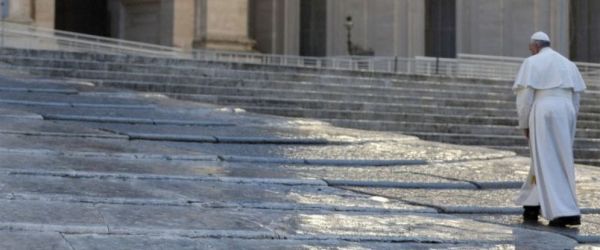Today’s Gospel passage (cf. Mk 8:27-35) turns to the question that permeates the whole Gospel of Mark: who is Jesus? But this time Jesus himself poses it to his disciples, helping them to gradually address the question of his identity. Before asking them, the Twelve, directly, Jesus wants to hear from them what the people think about him, and he is well aware that the disciples are very sensitive to the Teacher’s renown! Therefore, he asks: “Who do men say that I am?” (v. 27). It comes to light that Jesus is considered by the people as a great prophet. But, in reality, he is not interested in the opinions and gossip of the people. He also does not agree that his disciples should answer the questions with pre-packaged formulas, quoting well-known individuals from Sacred Scripture, because a faith that is reduced to formulas is a short-sighted faith.
The Lord wants his disciples of yesterday and today to establish a personal relationship with him, and thus to embrace him at the centre of their life. For this reason he spurs them to face themselves honestly, and he asks: “But who do you say that I am?” (v. 29). Today, Jesus addresses this very direct and confidential question to each of us: “You, who do you say that I am? All of you, who do you say that I am? Who am I for you?”. Each person is called to respond, in his or her heart, allowing each one to be illuminated by the light that the Father gives us in order to know his Son Jesus. And it can also happen to us, as it did to Peter, that we passionately affirm: “You are the Christ”. However, when Jesus tells us clearly what he told the disciples, that is, that his mission is fulfilled not on the wide road to success, but on the arduous path of the suffering, humiliated, rejected and crucified Servant, then it can also happen that we, like Peter, might protest and rebel because this contrasts with our expectations, with worldly expectations. In those moments, we too deserve Jesus’ healthy rebuke: “Get behind me, Satan! For you are not on the side of God, but of men” (v. 33).
Brothers and sisters, the profession of faith in Jesus Christ cannot stop at words, but calls to be authenticated by practical choices and gestures, by a life characterized by God’s love; it calls for a great life, a life with an abundance of love for neighbour. Jesus tells us that to follow him, to be his disciples, we must deny ourselves (cf. v. 34), that is, the demands of our own selfish pride, and take up our own cross. Then he gives everyone a fundamental rule. And what is this rule? “For whoever would save his life will lose it” (v. 35). Often in life, for many reasons, we go astray, looking for happiness only in things, or in people whom we treat as things. But we find happiness only when love, true love, encounters us, surprises us, changes us. Love changes everything! And love can also change us, each one of us. The witnesses of Saints proves it.
May the Virgin Mary, who lived her faith by faithfully following her Son Jesus, help us too to walk on his path, generously spending our life for him and for our brothers and sisters.
[Pope Francis, Angelus 16 September 2018]












